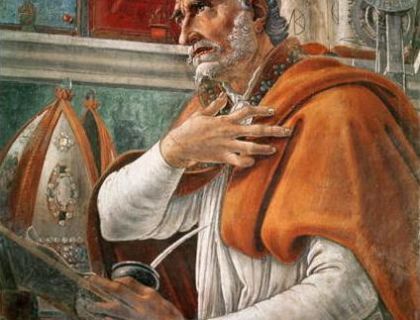On Mind and Flesh

.
Following is an exchange between me and Ricardo Nirenberg, editor of the OFFCOURSE literary magazine. Not trained in the Humanities, I was unaware of the vast body of human experience found in St. Augustine’s “Confessions,” and his obsession with the flesh. In both Ricardo’s reminiscences of himself as a thirteen year old and St. Augustine’s account of a scene with his father in the bathhouse, the controlled, rational power of the mind is being contrasted with the erratic power of sex. We all know that mind/brain and the single focal point of desire below are two poles of the body that create a force field pulling us hither and tither. The father, in both cases, acts weirdly: St. Augustin’s father has nothing better to do than run home and tell his wife about their son’s erection, creating a domestic stir. Ricardo’s father dismisses the profound insight of his precocious son as nothing but garbage.
(In his reply Ricardo refers to my essay “The Bed-sheet and the Esthetics of Deception” which appears in the same issue of OFFCOURSE and deals with the dishonest way of rendering sex scenes in TV movies).
Dear Ricardo:
The appearance, in Offcourse #69, of your remarkable recollections of the 13-year old, coincided with the publication of an article by Stephen Greenblatt in the June 19 New Yorker on “The Invention of Sex.” Reference is made to a scene in the bathhouse where St. Augustine’s father proudly observes the first stirrings of manhood in his adolescent son, and promptly reports it to his wife at home. His wife – young Augustine’s mother – is scandalized, and a fight ensues. We are talking late 4th century here. Greenblatt’s article construes a direct link between the involuntary nature of these stirrings (forever on the scholar’s mind after this embarrassing episode) — and the total lack of control over this basic tool of procreation — to St. Augustine’s monumental contribution to Christian Theology: the concept of the Original Sin.
I believe your profound insight as a boy, “if man’s orgasm lasted for hours instead of only a minute or so, there would be no philosophy, no sciences, no arts, no chess, nothing,” particularly as it is shared with your father, has a kinship of sorts with St. Augustine’s bathhouse episode and his later realization that man, by readily accepting the animal part of his nature, is fallen from grace by default.
None of this makes any sense to me. I’m a Protestant who has lost faith long time ago. I’m not a philosopher, did some sciences, took some photographs, and I’m bad at chess. By those measures I’m deeply corrupted in the eyes of St. Augustine and his wrathful God.
Best wishes,
–Joachim
Dear Joachim:
Thanks for your kind comments on my “Thirteenth Year”. You are right, indeed, to point out the symbolic relations between my sexual awakening and that of Augustine’s. Let me go a little further and say that whoever is writing about that sort of thing — writing a “Confessions” if you wish — must walk on the old steps of Augustine and Jean-Jacques Rousseau. In no way can one avoid one’s ancestors. Even before the camera, the photos, and the movies, there was an Aesthetics of Deception.
Best wishes
Ricardo

Leave a Reply